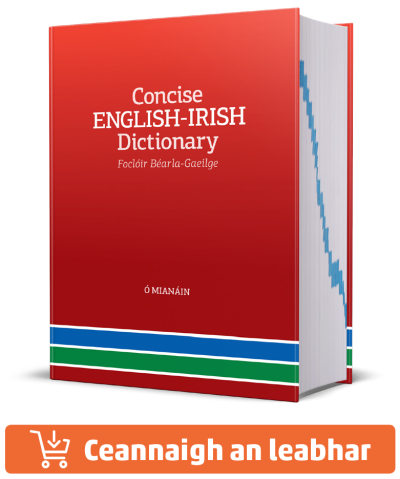Foclóir Gaeilge–Béarla
Ó Dónaill, 1977
An Foclóir Beag
Ó Dónaill & Ua Maoileoin, 1991
English–Irish Dictionary
de Bhaldraithe, 1959
Gramadach
Foghraíocht
olastáisiún
olatháirgeach
olc
olca
olcach
olcas
olcheana
oll
oll-
olla
ollach
ollacht
ollaigh
Ollainnis
oll-aireach
ollamh
ollamhanta
ollamhnacht
Ollannach
oll-ardchlár
ollás
ollásach
CUARDACH DROIM AR AIS
IN FOCLÓIR GAEILGE—BÉARLA
ABAIRTÍ
IN FOCLÓIR GAEILGE—BÉARLA
Ná déan ~ ar sheanóir, don’t make fun of an old man.
Leanbh, seanduine, ~, a peevish child, old man.
Tá an seanduine ag breith (na haimsire) leis go maith, the old man is wearing (his years) well.
Trí bheith an fhir mhaith, an tseanmhadra, three signs of a good man, of an old dog.
Seanduine an chaib, the toothless old man.
Seanfhear ~, spent old man.
Cé acu fear is sine? Which of them is the older man?
Is ~ an seanduine é, he is a great old man.
~ críon, disgruntled old man.
~ de sheanduine, fretful old man.
Seanduine ~, hardy, active, old man.
Tá sé ina sheanduine ~, he is a real old man.
Seanduine ~, decrepit old man.
Seanduine ~, withered, dry, old man.
Cibé ~ a tháinig ar an seanduine, whatever made the old man peevish.
Seanduine bocht ~, poor blind old man.
~ seanduine, bent old man.
Seanfhear ~, venerable old man.
~ bheag agus mhór, fhir agus mhná, shean agus óg, both little and great, men and women, old and young.
Fear is sine ná m’athair, a man who is older than my father.
Na seacht ~the, the seven wise men (of old).
Na seandaoine, the old folk; the men of old.
Na seacht ~í, the seven wise men (of old).
~ de sheanduine, bitter old man.
Seanóir ~, sage old man.
Tá an seanfhear ag ~t go mór, the old man is failing greatly.
Tá an seanfhear ag ~, the old man is failing.
Thit an seanduine go mór le bliain, the old man has declined a lot during the past year.
Seanduine tanaí ~, thin worn-out old man.
Ní maith le seanfhear an ~ a chailleadh, an old man doesn’t like to lose his authority.
